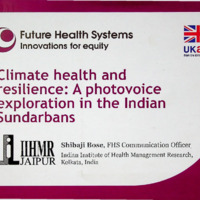Climate health and resilience: A photovoice exploration in the Indian Sundarbans
Item
- Title
-
Climate health and
resilience: A photovoice
exploration in the Indian
Sundarbans
- extracted text
-
Future Health Systems
Innovations for equity
UKaid
from the British people
Climate health and
resilience: A photovoice
exploration in the Indian
Sundarbans
| ITT l/TD
Shibaji Bose, FHS Communication Officer
Indian Institute of Health Management Research,
JAIPUR Kolkata, India
^FHS is a research
consortium working
to improve access,
affordability, and
quality of health
services for the
poor
.
Where we work
What we work on
Each of the country studies feeds into one of three cross-cutting
themes:
o Unlocking Community Capabilities (UCC)
o Stimulating Innovations
o Intern;; ng in complex adapt! ve systems (CAS)
the health situation of the
In India,
ocuses on improv
he Indian Sundarbans - a
more than
'lion inhabitant
a Bengal. Access to health
'■rable region oclimatically
egion is complies a ty the rough terrain and the
services in
winding tidal rivers of the deltaic region, among other things.
k
Through photovoice, we sought to understand how
marginalised groups - women-headed households in
/J
religious minority communities - navigated health
services in the Sundarbans.
About photovoice
Photovoice is a visual research methodology through which
people can represent, and enhance their community by
photographing them daily lives and the lives of those around
then d is a qua?' aove and participatory research method that
aim
capture v
ccurs when researchers are not necessarily
pres
Work j.g with se
■ women’s groups in the Sundarbans, FHS
provided a range of trainings - on how to use digital cameras,
how to approach a picture subject, and getting people’s consent to study participants. In turn, the participants used the cameras
provided to them to capture images that explain how a
J
changing climate affects their daily livelihoods, barriers that
\
exist to accessing health services, and ways that locals
dk
are adapting to these challenges.
^^k
Relationship
between
climate and
health
Meen dhara: A costly way to make a living?
Meen dhara, or prawn seed collection, is a
traditional way of making a living in the
community. But dirty water is becoming
more of a problem, especially for women
collectors. The dirty water can get inside
women, causing uterine infections.
Photographer: Bandana Haidar
(Binodhpur, Kultali)
Crab catching
Crab catching is one of the few livelihoods
remaining in one community, but it’s very
strenuous, risky and time-consuming.
1
‘Sometimes you get wounded, causing heavy
bleeding... then you have sit quietly,
waiting for your body to absorb the shock...
then you can start working again.’
Photographer: Parul Bhakta
(Satyadaspur, G-Plot)
Barriers to
accessing
health services
A broken ferry ghat
This ferry landing (ghat) has been broken
for last three months. This is the only way
to cross the river. The mainland, where the
nearest Public Health Centre is located, is
on the other side.
Photographer: Sita Das
(Jayasree Colony, G-plot)
The cost of medicine adds up quickly for
those with chronic conditions
‘I am suffering from a chronic disease...
Medicines are very costly and not always
available here. I have shifted to a rural
medical practitioner (RMP) who gave me
medicines on credit.’
Photographer: Lakkhana Debnath
(Jayasree Colony, G-Plot)
The cost of medicine adds up quickly for
those with chronic conditions
‘I am suffering from a chronic disease...
Medicines are very costly and not always
available here. I have shifted to a rural
medical practitioner (RMP) who gave me
medicines on credit.’
Photographer: Lakkhana Debnath
(Jayasree Colony, G-Plot)
J
Adaptive strategies
taken by the
communities
Teenage mother coddles a baby born at a
low birth weight
‘The girls in our community often get
married at the age of 13 or 14. The girl in
the picture gave birth to a low-weight baby
at the age of 16. Parents often marry off
their daughters at an early age to reduce
the number of family members. It’s a way of
managing resource constraints.’
Photographer: Sipra Haidar
(Binodhpur, Kultali)
,,X|
Older children as caretakers
‘I leave my younger child with the older
one. I know it is very risky but we have to
sustain.’
Photographer: Bornali Giri
(Nogenabad, Kultali)
FHS India photovoice participants
meet with the local self-government
(panchayat) to discuss health issues
highlighted through the
Outcomes and participants
Photovoice participants and photovoice facilitators worked
together as co-researchers to understand emerging themes and
research findings. They also curated exhibits to share the
photovoice results with local community members.
After presenting the results, a dialogue on community-based
solutions to the existing problems was initiated. The target
audience provided valuable feedback on the project results and
agreed to aid in the important task of reaching influential
decision-makers.
The FHS India photovoice was an eye-opener for many of the j
participants, researchers and others in the community. It
proved to be an important way to understand and identify ./"I
local-level issues that had otherwise been overlooked.
Contact us:
Future Health Systems is a research consortium
working to improve access, affordability and
quality of health services for the poor. We are a
partnership of leading research institutes from
across the globe working in a variety of contexts:
in low-income countries (Bangladesh, Uganda),
middle-income countries (China, India) and
fragile states (Afghanistan) to build resilient
health systems for the future.
Shibaji Bose
shibbose(«)gmail.com
Communications Officer
IIHMR, Kolkata, India
This document has been funded by the UK
Government. However, the views expressed
herein are those of the authors and do not
necessarily reflect those of the UK Government
or the partners in the Future Health Systems
research consortium.
Barun Kanjilal
barun(Siihmr.org
FHS India Lead Researcher
IIHMR, Jaipur, India
This work is licensed under a Creative Commons
Attribution-NonCommercial 3.0 Unported
k
License. 2013.
www.futurehealthsystems.org
> @futurehealthsys
- Media
 16632.pdf
16632.pdf
Position: 1659 (7 views)
